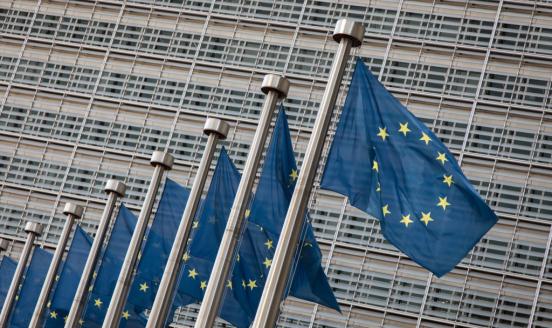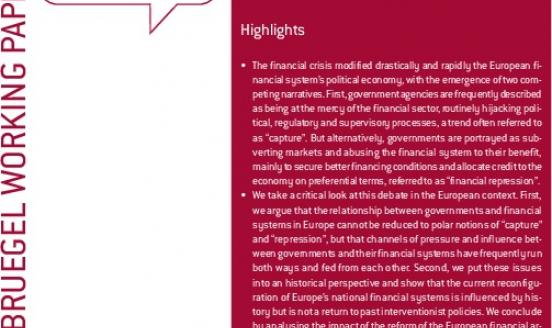The Weekender: Some conclusions from the ECOFIN in Copenhagen and internal rebalancing and German wages negotiations
Dear All, The French election is taking a very interesting turn and I believe that participation will be very high (by our historical standards) and
Dear All,
The French election is taking a very interesting turn and I believe that participation will be very high (by our historical standards) and that the far-left will keep on growing. Its candidate, Jean Luc Melenchon, is now polled at 15% and my personal gut feeling is that he is still under-polled.
Beyond French politics, it has been an eventful week with important meeting of BRIC Heads of States and Governments in Delhi, of the Syrian National Council (and the friends of Syria) in Istanbul and the first informal ECOFIN under the Danish presidency in Copenhagen.
It increasingly seems that those BRICs meetings are becoming more than a simple showcase and more and more a real international coordination venue. The BRIC’s declaration featured two important elements of global economic relevance. The first one is the strong encouragement to urgently implement IMF governance changes agreed to in 2010. The language used in the statement makes the increase in the IMF resources by the BRICs currently underway, somewhat contingent on the completion of concrete steps towards the governance changes, which is a more than acceptable quid pro quo considering the limited European efforts on the firewalls front (see below for more).
The other important statement is the plan to possibly start a new BRICs development bank considering the shortcomings of the WorldBank, which BRIC countries said only “mediates North-South cooperation” while it should “promote equal partnership with all countries as a way to deal with development issues and overcome an outdated donor- recipient dichotomy”. Robert Zoellick immediately fired a response in a FT interview but he seemed to agree on the benefits that the BRIC could find in such a new institution: China could use its reserves and internationalize its currency, India would be an important recipient and Brazil has a strong experience with running institutions like the BNDES.
In Istanbul, there was growing message of support towards the Syrian National Council both by PM Erdogan and Foreign Secretary William Hague. The SNC has offered to match salaries of the military personnel joining the free army and Hague stated that the UK would step up its support. This could escalate the conflict in the short term but accelerate political change.
But outside of these important economic and geopolitical developments, I will focus on the following:
1. Some conclusions from the ECOFIN in Copenhagen
2. Internal rebalancing and German wages negotiations
Some conclusions from the ECOFIN in Copenhagen
The informal ECOFIN meeting in Copenhagen was an important one as the important policy question surrounding the firewall had been settled and it left time to discuss more fundamental issues.
On the firewall issue –which I have discussed at length last week– Ministers basically chose the least ambitious of the three options presented to them by the eurogroup working group. They are basically keeping the EFSF alive until 2013 to service the existing programs but have decided not to use the 240bn left in the EFSF to finance any possible new program.
This is disappointing and I find it surprising that European policymakers can boast to have done their homework before going to the Spring meetings. But the US Treasury seems to have taken this decision positively and the BRICs are apparently ready to trade their IMF contributions againt other concessions at the Fund rather than more circumvolution in Europe.
This is very reasonable because in any case, even a bigger ESM wouldn’t have addressed the key weaknesses of the euro area. Contrary to the popular narrative about the “bazooka”, designing effective safety nets runs deeper than naming an illusory number. The governance and the architecture of the euro area as a whole needs to be revisited and this is where the three distinct reports that were presented to the ECOFIN were more encouraging:
1) A paper on Governance that Bruegel drafted was presented to Ministers, which highlighted a number of key challenges on the way towards governance reform. In particular, it appears very clearly that whether it is regarding to financial policy or budgetary policy. The European institutional set up seems to be gradually moving towards a variable geometry that requires important political changes especially on financial policy where the logic of the single market and that of supranational supervision and resolution seem to increasing set on colliding course.
2) A short 3 pages “Assessment of key risks and policy issues” warning on the situation in the banking sector and the extent to which the LTROs have merely delayed the moment of truth but certainly not prevented it. This note also raised the alarm level about the quality of bank funding and the risks of further tightening in lending standards and accelerating deleveraging.
3) Finally a paper Economic Outlook, Financial Stability in the EU: Policy Challenges and Way Forward that essentially stressed the weaknesses of the current financial architecture and the need to accelerate progress towards a proper financial supervision and resolution architecture.
All in all, beyond the slight disappointment of the firewall debate, it is somewhat encouraging that medium to long-term policy challenges are being discussed.
Internal rebalancing and German wages negotiations
There is a growing discussion on the speed and breadth of external accounts rebalancing within the euro area. In fact, the discussion relayed by Jeremie Cohen-Setton and Eric Monet on the gold standard and the euro very much echoes that preoccupation about asymmetric adjustment that Keynes, in his time, argued was the essential flaw of the Gold standard.
I entertained some hope that the adjustment would prove more symmetrical that anticipated. The lack of rebalancing from deficit countries that we are observing (see Guntram Wolff’s post on the matter) could be somewhat mitigated by some acceleration of the reflation in surplus countries.
There was indeed a very important step in this reaction yesterday when Verdi services union extracted a 6.3% increase in compensation for some 2 million public sector workers in Germany. But this is actually stretched over 2 years (3.5% pay rise retroactive to March 1st, a further 1.4% in January 2013 and another 1.4%pay rise in August 2013), so the year over year increase is in fact very moderate. However, there is far more pressure in the private sector and IG metall (representing some 3.6 million workers) is still pressing very hard for a 6.5% annual rise.
German unions are forced by law to engage in wage negotiations without industrial actions until April 28th. Wages of more than 9 million workers are now in negotiations. It is quite possible that negotiations will last until the very last moment but it would be very encouraging to see German wages picking up. It would boost aggregate demand and contribute to the internal rebalancing within EMU.
However, there is a limit to that strategy as well. Internal rebalancing shouldn’t occur at the cost of the external competitiveness of the euro area as a whole. There is indeed a mine of useful information in the recent Alert Mechanism Report on external imbalances prepared by the Commission, which showed that the EU as a whole lost 6% of exports market share from 2005 to 2010.
There is therefore a fine line to walk between creating enough reflation in surplus countries, controlled deflation in deficit countries to mitigate the underlying balance of payments crisis while improving structural competitiveness for the region as a whole. This requires incredible dexterity and a certain dose of schizophrenia.
Happy to hear your thoughts as usual.
Best Regards,
Shahin Vallée
Bruegel Visiting Fellow


